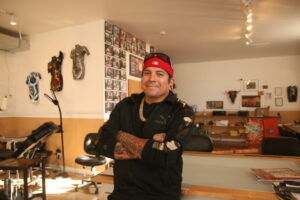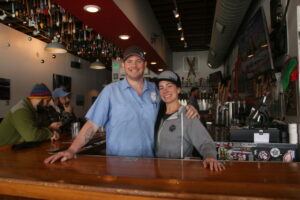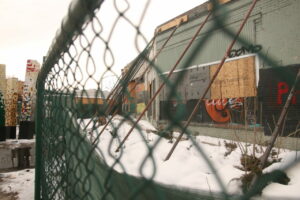By Eric Heinz
Drew Watson looked out the front window of his business of more than 13 years, Hops and Pie on Tennyson Street, thinking about how the small-business corridor has evolved and what it could look like in the near future.
Many of the single-family homes that lined Tennyson have been scraped or they’re on their way out, and several residential complexes have cinched in what was once a larger swath of smaller buildings. Although new regulations from the city mandate some kind of commercial ground-floor space in higher density residential buildings within the corridor from 38th to 46th avenues, several residential buildings with no commercial space have already been erected.
“None of these high-rises used to be here,” Watson said while pointing to a building across the street. “That used to be a bodega and laundromat and a barber shop. There’s a lot more businesses than when we first came here. I’d say there were a quarter of as many dining spots, pubs, and whatever else.”
Hops and Pie is in the midst of finishing off an outdoor seating area that will be equipped with heaters and possibly televisions in the roughly 3,800-square-foot space immediately adjacent to the south. Watson said he does embrace the changes, but some changes have gone too far, as the single-family homes that housed businesses he enjoyed seeing and visiting that used to line Tennyson are down to just a few left. “It’s really sad, in my opinion, but the business is always going to win,” Watson said. “When we came in here, all these little businesses were owned by the person occupying them, and now large investment firms are buying up the whole neighborhood.”
The last 20 years
Ortavio Griego, the owner of Monkey Fist Tattoo on Tennyson, has been in business for 12 and a half years and has seen the various changes of the corridor. He has lived in the area since 1997 and prior to the renaissance of Tennyson, the North Denver neighborhoods had some issues.

poses for a photo in his shop. Photo by Eric Heinz
“You never used to see people walking down the street with their dogs after dark,” Griego said. “You never saw anybody walking. If you would walk up and down the street at night, if you didn’t know the group of people that were coming towards you, you probably got beat up. So it was tough.”
Heather Noyes, a principal with Studio CPG landscape, planning, and architecture firm, said when Denver voters approved bond funding for the Tennyson streetscape project in 2008, it provided more access for pedestrians to the businesses.
“I think for a long time until maybe roughly the turn of the century, it was a really sleepy, underutilized commercial neighborhood,” Noyes said. “There were a lot of vacant buildings. There were a lot of bigger buildings that weren’t being utilized to their potential around that time.”
The Better Denver bond initiative from 2008 included $2.5 million for the Tennyson streetscape project, which ran from 38th to 44th avenues and involved the design and installation of new and improved sidewalks, furnishings, and pedestrian lighting.
“At the same time, some of this was going on, the city was generating the first Blueprint Denver project, and on the heels of that being adopted by City Council, there were a series of changes to the zoning code,” Noyes said. “I think the city tested the new zone districts as they were applied, but they didn’t test it along Tennyson Street, and the architectural forms combined with the speed of redevelopment on the heels of the approval of that new zoning code caught everybody off guard.”

Noyes said some of the businesses that had existed either left or had to wait out the construction of the streetscape project.
“Our community was ready to embrace change,” Noyes said. “We wanted to see more people over here. We wanted to see more families over here, and we recognized that if we wanted to have more commercial over here, we needed to increase the density. And so there was real support for compromise in land use.”
Griego said in the past 10 years since then, there has been a lot of construction along Tennyson as businesses started to flourish.
“There’s a lot of businesses that come and go, that’s the biggest thing,” he said. “Besides the influx of people, a lot of businesses come in and they leave. I think a lot of it has to do with the rents rising, the population going up and down around here.”
Councilwoman Amanda P. Sandoval said there used to be a hardware store that was her “main go-to” place (it’s now a coffee shop), and the changes at Green Door Furniture that are coming reminded her of visiting the store when it operated. “You could always go in and get an interesting Denver story and could not leave without smelling like cigar smoke,” Sandoval said.
What’s Happening
Since the adoption of the Tennyson Street overlay, which restricts developers from putting only residential units on the ground floor in the area unless it’s a single-family home, Sandoval said there will be a lot of redevelopment in the next year or two along the corridor.
“It’s not going to just be 100 percent residential; it’s going to keep that neighborhood feel of having hopefully smaller, community- serving uses along that ground floor to keep it pedestrian friendly, to keep it a destination, and to make sure that people are still using Tennyson as what it was,” Sandoval said.
Griego said it’s essential that commercial ground-floor spaces remain in place or increase in order to keep the viability of the corridor going.
“There are a couple of loopholes that they found making those commercial spaces smaller, which is frustrating because if you build a lot of places for people to live, they need places to go,” Griego said. “If you shrink that down, this whole area is going to collapse.”
Christine Parisi has been the owner of Parisi pizzeria, trattoria e vino since 1998 and said years during economic recessions and the pandemic have caused businesses to come and go throughout the years.
“Yet, we’ve persevered, and many of the businesses value keeping our street ‘local,’ so despite the big apartment buildings, the businesses still add a unique personality to the street,” Parisi said. “And density only offers more business for all of us.”
“The question will be how long will the rents be affordable to the smaller businesses?” Parisi continued. “We could continue to see another evolution if the landowners aren’t connected to the community. I have heard some sad stories where we’ve lost great businesses due to leasing issues, but also have heard of a few landowners that care about the community and structure leases around the tenant.”
Griego said that once construction or renovation of the buildings on Tennyson is complete, he hopes more restaurants and more places for people to hang out will open. He is actually in the process of opening his own lounge adjacent to Monkey Fist, which will be called Top Tenn.
“But right now, we’re kind of shrinking,” Griego said. “A lot of businesses are leaving. Local 46 is leaving, BookBar is leaving. It’s just strange.”
In the last year, Local 46, BookBar, and Mas Kaos all announced their closures. Kalaka Mexican Kitchen is currently in the process of opening in the Mas Kaos former location, 4528 Tennyson St, and BookBar is throwing a going away party on its last day on Jan. 31.
The owners of Local 46, who did not own the building and were forced to leave, took over a location in neighboring Edgewater (See Page 4 for more details). Watson said the turnover does happen from time to time along the corridor.
“This thing kind of happens around here when a family hits a certain age, their kids hit a certain age, they go to the ’burbs, which is totally understandable. I did the same thing,” Watson said.
What’s Coming
Eli Cox, owner of Berkeley Supply Co., said he doesn’t want to see any “big box” stores come to Tennyson.
“I’d like to see it remain local, or at least locally focused companies like maybe stuff that’s all over Colorado being here,” Cox said. “I am not mad at the direction (Tennyson) is going right now. I think a lot of the ground-floor retail being required is nice, not so it’s just these like, box apartments with nothing going on.”
Several properties are in the process of being developed or renovated within the Tennyson corridor between 38th and 46th avenues. Formerly the Country Gentleman’s Liquor store and Tennyson’s Tap, the lot at 4345 W. 38th Ave. is slated to become a five-story residential building with ground-floor commercial space, which could include a gym and bike shops.
The lot was purchased in April for $3.9 million by an LLC linked to Chicago- based Continuum Capital. Formerly Green Door Furniture, the building at 3985 Tennyson St. is currently being renovated with construction slated to be completed either late spring or mid-summer.

There will be three units for commercial space, and tenants Sweetgreen and Australian-inspired Two Hands have been announced, and there will be outdoor seating. The building at 3985 Tennyson is also to be renamed The Lantern, according to Dallas- based developer RUE.
At 4586 Tennyson St., which was formerly Local 46, plans have been filed to develop a three-story mixed-use building with 5,500 square feet of commercial space, six dwellings on ground floor and an additional 84 units on the second and third floors, with a roof deck.
The single-family home properties that were at 4353 N. Tennyson are being developed by First Stone Development, which paid a total of $2.6 million for the three lots between 2018 and 2020. First Stone plans to construct a three-story apartment complex with 34 units and 2,500 square feet of ground-floor commercial space. There are also plans for a common area on the roof. The units will be one-bedroom and two-bedroom apartments, and some will have a mezzanine.
The walkability of the Tennyson neighborhood is what drew Taub to the area, and First Stone recently built a series of townhomes in the neighborhood that sold in six months. The development will be one of the first under the Tennyson Street design overlay.
Compass Glass Co. is moving to 5310 Tennyson from its current location at 3973 Tennyson. The business was established in 1957, according to the company website.
The empty lot at 4144 Tennyson has not had anything filed for development, although Griego said he thinks it too will eventually become a three-story mixed-use building. Griego said business owners should keep up with what’s happening on the street.
“There’s a lot of really good shops on Tennyson,” he said. “A lot of businesses on this block, including ourselves, do a lot for charity. In the past before COVID, we had a really high participation from the neighborhood in charities and community involvement. And I feel that if you’re in this area and you love this area, I would say get involved in the community more.”
Watson said he hopes Tennyson will continue to be a place for gatherings, such as after a Little League baseball game or families coming down after school.
“It’s hard to articulate because I miss a lot of what drew us here,” Watson said. “I like this too, but I do miss some of old Tennyson, for sure.”
Parisi said she is optimistic about the future of Tennyson, saying that although there’s no getting back the smaller, single-family homes, there is a direction
“I see much more promise in some of the other developments on our street,” Parisi said. “Mixing residential and commercial is what Tennyson deserves as long as parking and nearby homes will always be respected. I hope that Tennyson will always serve as the heart of Berkeley in a way that only adds to the neighbors’ lives.”

Kudos to Eric Heinz for the outstanding article. It’s great to hear all these local voices and from business owners. And knowing more about the history of the neighborhood as well as planned developments on Tennyson is very helpful for someone like me, who owns a home in this community. Seems like lots to celebrate, lots to consider, and a lot of good reasons to become more involved in the neighborhood. If anything, to help influence the direction and preservation of our street as change inevitably comes.